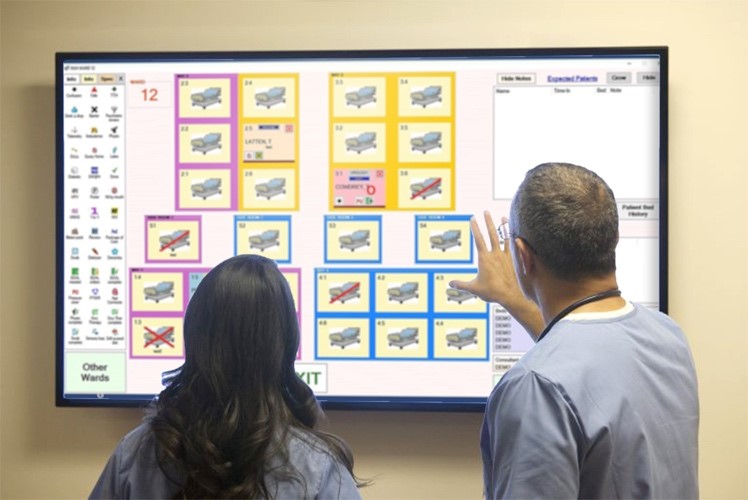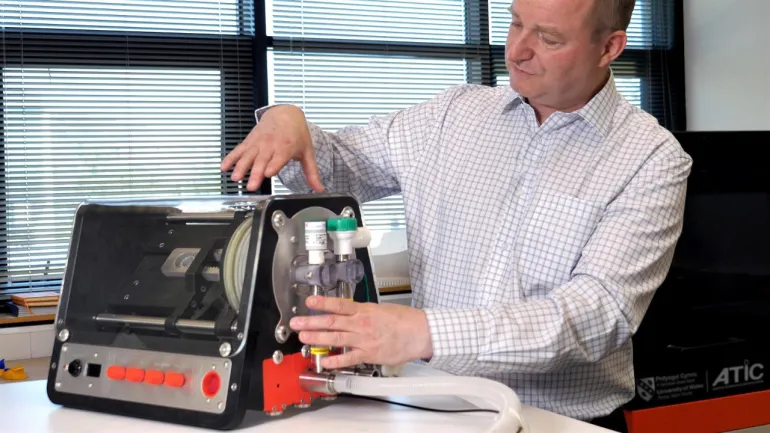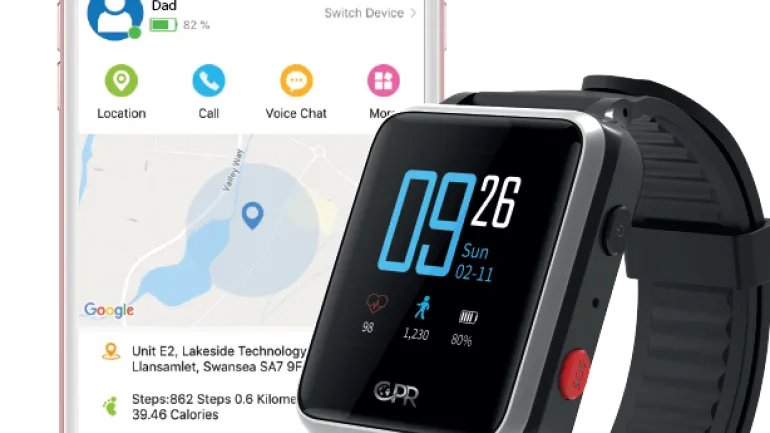Accelerate partners, the Assistive Technologies Innovation Centre (ATiC) at the University of Wales Trinity Saint David and Swansea University’s Healthcare Technology Centre (HTC) are collaborating with Cwm Taf Morgannwg University Health Board (CTMUHB) to develop a new interactive digital display system for use on wards throughout four of the health board’s hospitals.

Taking inspiration from traditional whiteboards used to keep track of patients on the ward, the interactive ‘e-whiteboards’ have made a huge impact already.
Previously, any key patient information was shared on the ward using a written marker-pen whiteboard. This new system is cleaner, more organised, and efficient, and it has already revealed great potential for further development in the hospital.
The e-whiteboards display the ward in a map view, with each patient represented as a small rectangle. Ward staff can keep track of patient needs and conditions by modifying the icons in each rectangle.
These icons allow staff to communicate with each other, plan their day, keep track of what needs to be done, and share information with other clinicians who may not be based on the ward. The e-whiteboards have saved time, prevented errors, and kept lines of communication clear and efficient.
Staff have become great advocates for the new system and continue to be instrumental in its development. Their needs continue to be at the forefront in developing new features for the boards.
The e-whiteboards have been crucial during the Covid-19 crisis. As Tom Powell, CTMUHB Innovation Manager, put it,
“[IT Manager] Liam and his team have amended symbols specifically for Covid-19, developing new features to indicate the patient’s length of stay, and the onset of their symptoms”.
The e-whiteboards continue to evolve to better serve patients and staff.
As the e-whiteboards are an ongoing innovation project, the team needed specialist support to further develop the e-whiteboard concept. Tom Powell sought out the help of the Accelerate programme:
“The current version has received widespread approval, although it is a working prototype and there are many additional features and improvements possible, including functionality and wider clinical capability across our health board.”
The Assistive Technologies Innovation Centre (ATiC) at the University of Wales Trinity Saint David has joined the CTMUHB e-whiteboard team to transform the current system into a ‘version 2’, and create a foundation for the future.
ATiC brings expertise in user experience research and user-centred design thinking to help transform healthcare innovations. The team also includes another Accelerate partner, the Health Technology Centre at Swansea University, who bring data analysis capabilities and will be measuring and analysing the impact of the changes to the e-whiteboard after they’ve been rolled out.
The joint team’s goals are to develop and optimise the visuals and features of the e-whiteboard, particularly the icons and the interface, and assess the impact of these changes.
ATiC Innovation Fellows Caroline Hagerman and Tim Stokes shadowed and interviewed ward staff across three CTMUHB hospitals to understand the needs of different users and the diversity of perspectives around the e-whiteboard. The plan was originally for a user workshop, but Covid-19 led to the generation of an online survey distributed to ward staff, designed to quickly probe users’ opinions on design, symbolism, new features and much more.
Liam Morrisey of the CTMUHB IT Team said:
“It’s been fantastic working with the ATiC and HTC team as they’ve provided invaluable unbiased feedback based on conversations they’ve completed with the multidisciplinary staff on the front line of our hospitals.”
The final e-whiteboard design will incorporate a redesigned set of icons, created in collaboration with Waters Creative graphic design agency. The e-whiteboard will also interpret the ward staff’s feedback to allow more space for the things that matter to them. It will also feature new ways to visualise patient information and to communicate it to other special teams within the hospital, such as the physiotherapy or diabetes team.
The project has demonstrated the value of user experience research in engaging end-users and producing useful features in product development. Caroline Hagerman, ATiC Innovation Fellow, added:
“Our research has helped us to hear from a wide range of voices within hospitals, and to develop new features that will actually help users, not bring change for the sake of it.”
This project is part of the Accelerate programme which is part-funded by the European Regional Development fund, through Welsh Government.



